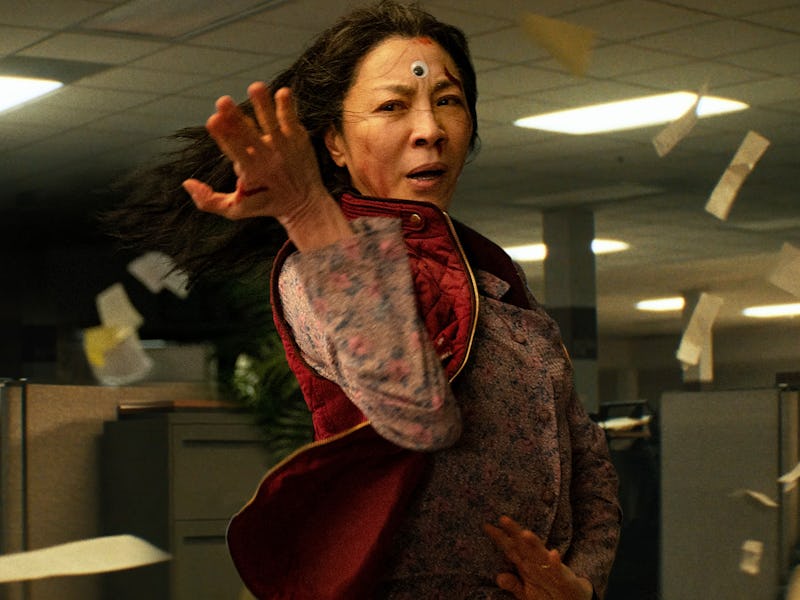Everything Everywhere’s Oscar Win Exposes the Bland Reality of Marvel Movies
It doesn’t take a googly eye to see why Everything Everywhere All at Once is a triumph.

In May 2022, Marvel Studios released Doctor Strange in the Multiverse of Madness, a movie that promised the return of schlocky horror director Sam Raimi to the superhero genre, with a title that promised the pulpiest Marvel movie yet. Instead, we got a passable action romp that spent most of its time in an alternate universe where — brace yourself — the red and green traffic lights were switched.
But by the time Multiverse of Madness was released, another multiversal adventure was already on its way to becoming the most beloved movie of the year. Everything Everywhere All at Once, Daniel Kwan and Daniel Scheinert’s wild, wacky, provocative, and profound sci-fi spectacle would become A24’s biggest hit. Now, it’s the strangest Best Picture winner in Oscars history. Its win is an incredible achievement for many reasons — star Michelle Yeoh is the first Asian woman to win Best Actress, it’s the most-awarded Best Picture winner since Slumdog Millionaire, it’s the only winner ever to feature an extended joke about butt plugs — but it also highlights one important truth: weird cinema is still alive and kicking.
The weirdest gag in Everything Everywhere all at Once became the most strangely moving part of the movie.
This may be a strange triumph to celebrate considering Guillermo del Toro’s Shape of Water, a fantasy drama in which a woman makes sweet love to a fish man, won Best Picture just six years ago. But Hollywood is becoming increasingly risk-averse, and our dominating pop culture franchise thinks the craziest alternate universe invention would be pizza sold as a ball.
But Everything Everywhere all at Once wasn’t afraid to take its multiversal premise to the most bizarre corners of the imagination. A gag about Yeoh’s Evelyn Wang misremembering Pixar’s Ratatouille became one of the best parts of the movie. A dumb joke about hot dog fingers becomes one of the most unexpectedly moving parts. Homages to Wong Kar-wai and Satoshi Kon are made with the reverence of filmmakers who grew up surrounded by anxiety, existential angst, generational trauma, and the constant noise of the internet.
Everything Everywhere All at Once was a manic jolt in the arm at a time when Hollywood seems to be moving back into the safety of reboots and sequels. And no franchise is more indicative of this retreat than Marvel.
Doctor Strange in the Multiverse of Madness did not live up to its title.
Marvel had its worst year yet in 2022, and Multiverse of Madness was just a symptom of a larger problem. The formula has taken over, and all sense of individuality and originality has been sacrificed in favor of the quip. The action is stale, the stakes are nonexistent, and the visuals look gray and dim. Marvel’s recent releases are the polar opposite of what Everything Everywhere All at Once proves: audiences will embrace movies that take risks.
Is Everything Everywhere All at Once a sign the tide is shifting, and that original, bold movies could be embraced by studios again? Or is it just a fluke? It’s too early to say, but it’s at least a sign that Hollywood’s most prestigious voting body is still yearning for exciting experiments. It’s a message Marvel should take note of.